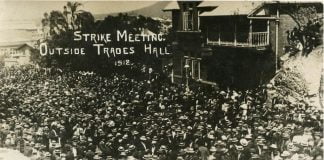From first to last Thatcher was a warrior—a warrior for the ruling class and for free market capitalism.
When Thatcher first served as a minister in the Heath Tory Government of 1970-74 she became known as “Maggie Thatcher-Milk Snatcher” for ending the supply of free milk to children in schools.
When she defeated Ted Heath for the Tory leadership in 1975 it signified the Tory Party’s and the ruling class’s punishment of Heath for his defeat at the hands of the miners (and other trade unionists) in 1972 and 1974. She was elected to reverse and revenge those defeats.
In the run up to the General Election of 1979 she deliberately played the racist card saying, “People are really afraid that this country might be rather swamped by people of a different culture.” Similarly she condemned Nelson Mandela as a terrorist while backing South African Apartheid.

When Thatcher became PM in 1979 she immediately presided over a deep recession and mass unemployment, which rose rapidly to levels not seen since the 1930s.
It was not Thatcher who caused the recession; that was the contradictions of capitalism, but her harsh policies did absolutely nothing to mitigate its devastating effects on working class people, on the contrary they made it worse. This was when she famously proclaimed, “You turn if you want to. The lady’s not for turning”.
Wars
The same stone hearted indifference to human suffering was brought to bear on the Irish Republican hunger strikers in 1981. The attempt to criminalise Republican prisoners of war had been begun by the Labour Government in 1976, but Thatcher pursued it with a vengeance. Even after Bobby Sands was elected MP in the middle of his strike Thatcher persisted in the manifestly absurd claim that he was merely a common criminal. And when Bobby Sands died she showed no regret.
Thatcher’s haughty denunciation of the “men of violence” as she liked to call Republicans, did not, of course, extend to men of violence on her side of the political spectrum. Among those she befriended were General Pinochet, the military dictator of Chile, responsible for the murder of 30,000 Chileans and the torture of many more.
The Falklands War of 1982 was classic imperialist war mongering involving the ruthless sacrifice of young lives for political gain. Small islands, 7000 miles away off the coast of Argentina, with a tiny population, the Falklands/Malvinas’ status as British was a hang over from the days when Britain was a global imperial power. The brutal Argentinean junta occupied the islands as a jingoist distraction from their deep problems at home, in the mistaken belief that Britain would not respond. Thatcher saw her chance and dispatched a task force to the South Atlantic.
Victory at the cost of 649 Argentinean and 258 British young men with over 2500 wounded, helped lead to Thatcher’s second term and the implementation of her carefully planned assault on the trade unions.
Thatcher’s other “achievements” of these years included the mass sell off of council houses which permanently undermined the provision of council housing in Britain and the systematic privatisation of state assets.
These triumphs over the unions and “socialism” as she called it, for which the Tory Party and the British ruling class remain deeply grateful, were accompanied at the opposite end of the social spectrum by an economic boom spearheaded by the City of London. This saw the emergence of new social types: “City Boys” with big bonuses and Porsche cars and YUPPIES (young upwardly mobile professionals).
This was a time when capitalism was celebrated, conspicuous consumption was “in” and we were told that “greed is good”. There was a parallel phenomenon with Wall St. in Reagan’s America.
Thatcher gained a third election victory in 1987 but, convinced of her own invincibility, she overreached herself with the Poll Tax. This introduced a single flat-rate per-capita tax on every adult, at a rate set by the local authority. It was therefore hugely unfair with an unemployed person paying the same as the Duke of Westminster.
The result was a mass campaign of non- payment, resulting in the jailing of a number of activists such as Tommy Sheridan, complemented by a series of mass demonstrations culminating in a monster demonstration of 200,000 in London on 31 March 1990 which turned, when attacked by the police, into a huge riot in Trafalgar Square.
This broke both the poll tax and Thatcher. By November she was gone, brought down by her own backbenchers and cabinet colleagues.
John Molyneux
Abridged from johnmolyneux.blogspot.com





